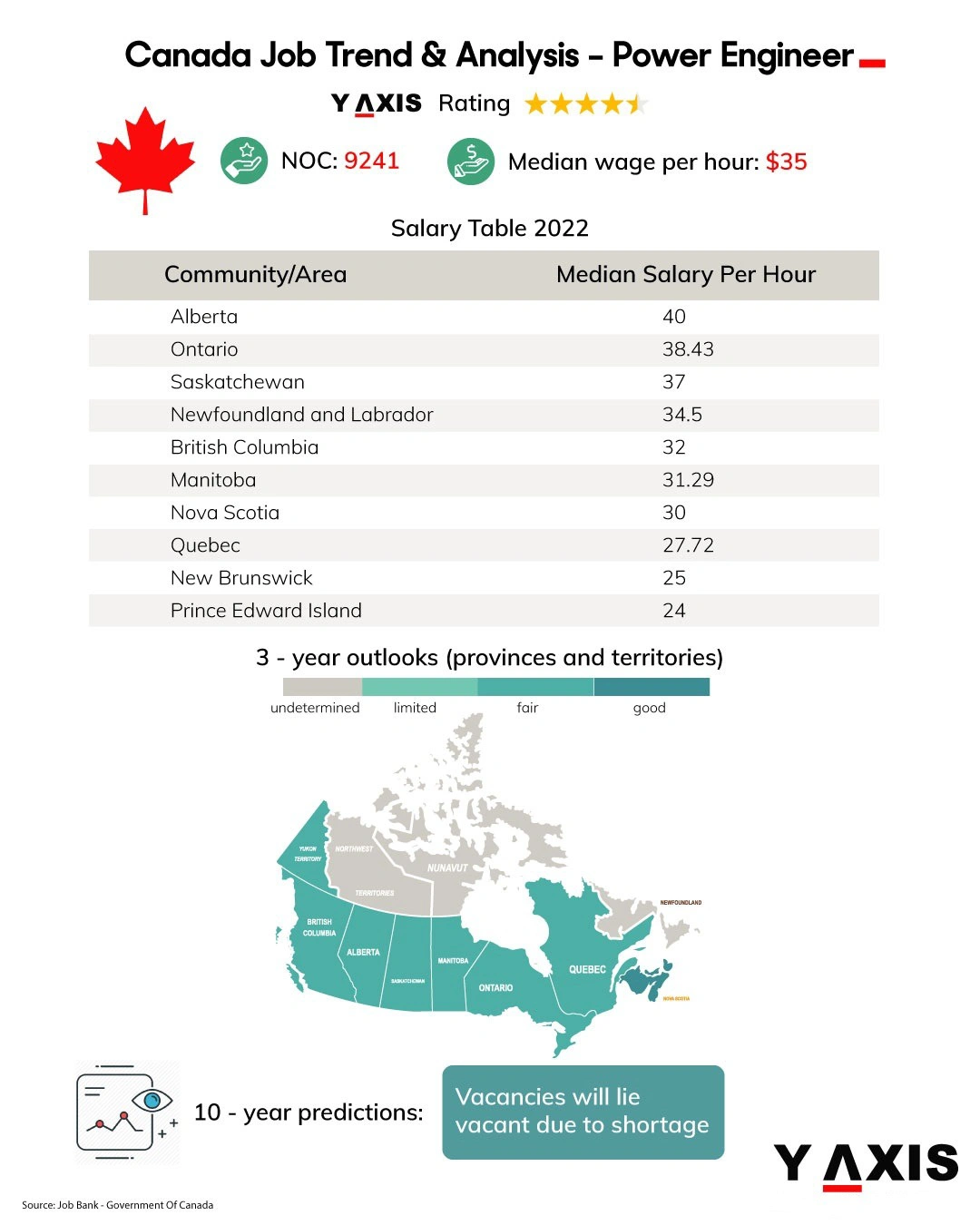Posted on October 26 2021
Job Trends - Power Engineer in Canada
By , Editor
Updated November 15 2023
If you are a Power Engineer and looking for a settlement overseas, Canada would be your right choice.
Canada, being the top nation in welcoming foreign nationals. It has a large group of buildings, factories or industrial sites, hospitals, pulp mills, oil upgraders, refineries, manufacturing plants, and countless other operations. To maintain all these operations, power is the critical source and is the heart of all mechanical, electrical, and electronic processes. Hence, Canada relies on Power Engineers to manage all these operations accurately.
Power Engineer is one of the most promising careers in Canada. In order to migrate and settle in Canada with PR, you need to explore the job trends of Power Engineer in Canada.
Job Trends of a Power Engineer in Canada - NOC 9241
Power Engineers in Canada need to operate and maintain reactors, turbines, boilers, generators, stationary engines and auxiliary equipment to generate electrical power and to provide heat, light, refrigeration and other utility services for commercial, institutional and industrial plants and facilities. They also need to operate switchboards and related equipment in electrical control centres to control the distribution of electrical power in transmission networks.
Power Engineers in Canada are employed by:
- Power generation plants
- Electrical power utilities
- Manufacturing plants
- Hospitals
- Universities and Government Commercial Establishments
Roles and responsibilities of a Power Engineer in Canada
This group performs some or all of the following duties:
- Operate automated or computerized control systems, stationary engines and auxiliary equipment such as reactors, boilers, turbines, generators, pumps, compressors, pollution control devices and other equipment to generate electrical power and to provide light, heat, ventilation and refrigeration for buildings and industrial plants and facilities
- Start up and shut down power plant equipment, control switching operations, control water levels and communicate with systems operators to regulate and co-ordinate transmission loads, frequency and line voltages
- Monitor and inspect plant equipment, computer terminals, switches, valves, gauges, alarms, meters and other instruments to measure temperature, pressure, air and fuel flow and emissions to detect leaks or other equipment malfunctions and to ensure plant equipment is operating at maximum efficiency
- Analyze and record instrument readings and equipment malfunctions
- Troubleshoot and perform corrective action and minor repairs to prevent equipment or system failure
- Respond to emergency situations if required
- Clean and lubricate generators, turbines, pumps and compressors and perform other routine equipment maintenance duties using appropriate lubricants and hand, power and precision tools
- Maintain a daily log of operation, maintenance and safety activities, and write reports on plant operation and non-compliance
- May assist in the development of operation, maintenance and safety procedures.
- Power systems operators
- Operate and monitor computerized switchboards and auxiliary equipment in electrical control centres to control the distribution and to regulate the flow of electrical power in the transmission network
- Co-ordinate, schedule and direct generating station and substation power loads and line voltages to meet distribution demands during daily operations, system outages, repairs and importing or exporting of power
- Monitor and visually inspect station instruments, meters and alarms to ensure transmission voltages and line loadings are within prescribed limits and to detect equipment failure, line disturbances and outages
- Issue work and test permits to electrical and mechanical maintenance personnel, assist maintenance and technical personnel to locate and isolate system problems, and assist during routine system testing
- Complete and maintain station records, logs and reports.
Job titles of a Power Engineer in Canada
- Auxiliary plant operator
- Stationary engineer
- Power engineer
- System controller - electrical power systems
- Energy from waste plant operator
- Control room operator - electrical power systems
- Electrical power systems operator
- Nuclear generating station field operator
- Load dispatcher apprentice - electrical power systems
- Building systems technician
- Nuclear reactor operator - electrical power systems
- Distribution control operator - electrical power systems
- Power dispatcher - generating station
- Power plant stationary engineer
- Apprentice power dispatcher
- Power plant operator
Prevailing wages for a Power Engineer in Canada
Power Engineer Jobs in Canada are often better paid than other countries. The wages for a Power Engineer in Canada differs in each province. The median wages of a Power Engineer in Canada is 38.85 $ per hour. Below table represents the low, median, and high wages of Power Engineer in each province and territory in Canada.
| Community/Area | Wages ($/hour) | ||
| Low | Median | High | |
| Canada | 21.62 | 38.85 | 57.7 |
| Alberta | 26.07 | 45 | 63 |
| Saskatchewan | 23.57 | 44.58 | 58.5 |
| Ontario | 23.08 | 41 | 58 |
| British Columbia | 27.2 | 38.12 | 57 |
| Manitoba | 25.27 | 37.2 | 49.7 |
| Nova Scotia | 15 | 32.5 | 43 |
| Newfoundland and Labrador | 20.5 | 32 | 45 |
| Quebec | 17 | 27 | 52 |
| New Brunswick | 18.75 | 25.98 | 43 |
| Prince Edward Island | 21 | 25 | 43.27 |
Power Engineer job opportunities for the coming years in Canada
For Power Engineers in Canada, there are many job openings for both experienced and new job seekers over the period 2019-2028. The job opportunities for a Power Engineer in Canada are always on high tide, because Canada majorly has mechanical, electrical and electronic operations.
| Location | Job prospects |
| Alberta | Fair |
| British Columbia | Fair |
| Manitoba | Fair |
| New Brunswick | Good |
| Newfoundland and Labrador | Fair |
| Northwest Territories | Limited |
| Nova Scotia | Fair |
| Nunavut | Undetermined |
| Ontario | Fair |
| Prince Edward Island | Fair |
| Quebec | Fair |
| Saskatchewan | Fair |
| Yukon Territory | Fair |
Eligibility criteria for a Power Engineers in Canada
To get qualified as a Power Engineer, you should meet the following pre-requisites:
- Completion of secondary school is usually required.
- Power engineers require a college training program in stationary or power engineering and several years of work experience in the field.
- Power engineers require a provincial or territorial power engineering or stationary engineering certificate according to class.
- Stationary engineer trade certification according to class (4th, 3rd, 2nd or 1st class) is compulsory in Nova Scotia and Quebec and available, but voluntary in New Brunswick.
- Power systems operators require completion of a three- to five-year power system operator apprenticeship program or Over three years of work experience in the trade and some college or industry courses in electrical and electronic technology.
- Trade certification is available, but voluntary for power system operators in Newfoundland and Labrador.
- Control room operators at nuclear power plants require licensing from the Canadian Nuclear Safety Commission.
Professional certification and licensing
As a Power Engineer you need to get a certification from a regulatory authority before you start working. Below is the list of regulations for each province or territory.
| Location | Job title | Regulation | Regulatory body |
| Alberta | Power Engineer | Regulated | Alberta Boilers Safety Association |
| British Columbia | Boiler Operator | Regulated | Technical Safety BC |
| Power Engineer | Regulated | Technical Safety BC | |
| Refrigeration Operator | Regulated | Technical Safety BC | |
| Manitoba | Power Engineer | Regulated | Manitoba Office of the Fire Commissioner |
| Newfoundland and Labrador | Power Systems Operator | Regulated | Apprenticeship and Trades Certification Division, Department of Advanced Education and Skills of Newfoundland and Labrador |
| Nova Scotia | Power Engineer | Regulated | Technical Safety Division, Labor and Advanced Education |
| Ontario | Facilities Mechanic | Regulated | Ontario College of Trades |
| Facilities Technician | Regulated | Ontario College of Trades | |
| Operator | Regulated | Technical Standards and Safety Authority | |
| Operating Engineer | Regulated | Technical Standards and Safety Authority | |
| Process Operator (power) | Regulated | Ontario College of Trades | |
| Prince Edward Island | Power Engineer | Regulated | Department of Communities, Land, and Environment, Prince Edward Island Government |
| Québec | Distribution System Controller | Regulated | Emploi Québec |
| Stationary Engine Mechanic | Regulated | Emploi Québec | |
| Saskatchewan | Power Engineer | Regulated | Technical Safety Authority of Saskatchewan |
How can I move to Canada as a Power Engineer?
How can I move to Canada as a Power Engineer? is the first question that flashes in your mind. Of course there are various pathways through which Canada invites Power Engineer.
Y-Axis presents you the step by step guide to follow in order to immigrate to Canada:
Step 1: Check your CRS Score
Y-Axis allows the migrants to check their CRS score through its instant Canada Skilled Immigration Points Calculator for free.
Check your eligibility right away.
Step 2: Check your Qualifications Accredited for Canada
To work and settle in Canada as a Power Engineer, you need to have your educational qualifications (earned outside of Canada) accredited and ensure that it is recognized in Canada.
Step 3: Immigration process
Next you can start with the immigration process by applying through the following pathways:
- Express Entry system
- Provincial Nominee Program
- QuebecSelected Workers Program
- Saskatchewan PNP
- Ontario PNP
- Manitoba PNP
- British Columbia PNPTech Pilot program
- Alberta PNP
- Nova Scotia PNP
- New Brunswick PNP
- Prince Edward Island PNP
- Newfoundland and Labrador PNP
- Yukon PNP
- Northwest Territories
Step 4: Apply for Power Engineer position in Canada
It is not mandatory to have a job opportunity to move to Canada, but you having a job opportunity fastens your process. This is because a valid job offer increases your score by 50 and 200 PR points.
Tags:
Job Trends
Power Engineer Jobs in Canada
Share

